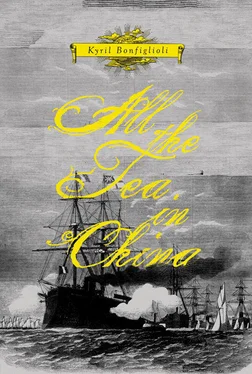“Never mind,” I said briskly, “I am just testing my thoughts, you understand.”
“Yerss. There’s summink in it though. Make a wrong course so’s we pass close to land on a rising tide in the dark and we could swim ashore.”
“Mrs Knatchbull cannot swim,” I said. I did not know this, but what I did know was that I could not.
“Oh,” he said in a disinterested voice.
“Now then,” I said, still briskly, “how long would it take to lower a boat, quietly, in the dark; one large enough to take us all?”
“Quarter-boat too small,” he mused. “Lower the launch — fifteen minutes. In the dark — twenty. If we got everything cleared away, falls loosened and such, all before’and like, p’raps ten minutes in a flat calm.”
“Excellent!”
“But quietly ,” he went on, remorselessly, “carn’t be done. Arsk me to slaughter a pig quiet and I’d give it a try, but lower a long boat …” I think he would have laughed if the need for silence had not been so imperative.
“Don’t jump to conclusions!” I rapped — but as quietly as it is possible to rap. “I am examining the possibilities; your part is to make seaman-like comments. When asked.”
“Aye aye, Sir,” he replied, gratifyingly. There was no trace of surliness in his voice: I might not know wood from canvas but I was a gentleman and therefore capable of thought. All he had was knowledge. He could probably have made an ass of me at draughts but he would not have attempted to learn chess, for he knew his station in life. (This is the art of dealing with the lower orders: praise their mastery of the craft to which they are born but keep the chess-board locked up as you would your wine-cellar.)
“Now,” I said, “suppose that the mutinous, self-appointed officers were locked in the cabin when they have dined and supped and one of our hearts of oak knocked the quartermaster’s brains out quietly; would that give us time to lower the boat?”
He breathed deeply; one would have thought that he was thinking.
“No, Sir,” he said. “You couldn’t reckon they’d all be drunk enough; I’ve seen that crazy Boothcastle wide awake after a quart of rum. They got all the firearms in there, they could blow the lock off before you could say ’ow’s yer farver.”
“My pistol?”
“Might ’old ’em back, might not. Then, when we’re in the boat?”
“Hm,” I said, striving for a tone of “hm” which would convince him that this was what I had expected him to say.
“Anyways,” he went on, “there’s a fair lot in the fo’c’sle what would come raging out at us; they got their hearts set on South Americky and freedom. They’d reckon that if we got ashore a King’s ship would be arter them in jig-time — and we knows their names and their destination. Which ain’t ’Eaven,” he added, obscurely. “You couldn’t ’old off the cabin and the fo’c’sle both, not with that pistol — the men forrard still ’ave their case-knives, let alone the firearms aft. See?”
I saw, but preserved my feigned nonchalance.
“Quite right,” I said. “Now, this gun,” nudging the pivot-piece beside me, “I fancy this could be brought to bear on the fo’c’sle? There is a garland of shot beside it, a flexible rammer and sponge racked against the bulwarks, a flint in the lock and the expense-chest of powder cartridges under my very foot as I speak. What do you say to that, eh?”
“Wot I says, Sir, is: tap the expense-chest with your boot.”
I tapped. It rang hollow. It seemed to me that just such a tap at my head would have produced a similar sound, for that had been the last of my ideas, my trump card. Never again would Transom call me “Sir”. My hand stole to my collar and fingered the soft skin at my throat. Transome maintained a respectful silence, no doubt sure that I was elaborating some further part of a plan, but I was considering the technicalities of hanging. In the hands of a skilled craftsman, a well-calculated drop brings kindly oblivion in a twinkling of an eye, I am told, but to be hoisted aloft in a noose is a quite different matter: more prolonged, tediously uncomfortable and calculated to make the subject behave in various shameful and disgusting ways which I shall not trouble you with describing.
My craven musings were blown to pieces by a deep, sotto voce cough, six inches behind me, I did not quite jump over the side, nor did my heart altogether stop, but I must confess that I shuddered violently and, indeed, may have moistened myself a little.
In an instant I collected myself, realising that it was only the Doctor: a man to be trusted regardless of his creed or colour.
“Ah was wokened up by yo’ thinkin’, Mistuh Cleef,” he rumbled softly in my ear, “so ah jes’ naturally come out heah to heah what you was saying. ’T’warn’t at all the same as what I heard you a-thinkin’.” I looked over my shoulder at him: his grin was like the keyboard of a small piano-forte.
“Speak, thou apparition,” I said.
“Cain’t hex me, Mistuh Cleef; I hear’t longer words nor that. Jes’ wanted to tell you about my medicine chest.”
“Yes, well, I did see it before,” I mumbled, swallowing the blood from my bitten tongue. (It was, indeed, a beautiful chest, with double doors and sliding sides and back, all filled with little bottles of Gregory’s powder, snake-oil and other useful jollops.)
“Didn’t see the secret drawer in the bottom, Mistuh Cleef. Didn’t see the big flat bottle of micky-o-flynn.”
Transom, beside me, stiffened into attention; clearly this meant something. I raised an interested eyebrow: the doctor could see it in the dark, I was sure.
“Cheloral hyderate,” he explained, “ ’nuff to send a school o’ whales to sleep.”
My mind raced.
“Only trouble,” went on the cook, “it don’t keep too long. Bo’t it two year ago. Still send ev’one to sleep but anyone ain’t fit, well they jes’ might not wake up agin.”
“Tsk tsk,” I said. “That is a risk we must take, is it not?”
Our plans were soon laid.
On the night, all went wonderfully well. Only the watch on deck had not drunk of the micky-o-flynn in their fish-chowder; only six of these were not of our persuasion and they were tapped upon the head and battened below hatches. I made a dutiful visit to see that all was well in the specie-room and took a little gold to cover travelling-expenses. Then I went onto the quarter-deck and showed the steersman my pistol. Without hesitation he agreed that it was better to be tied up than shot. I delivered him to Transom, set a course to take us as near to the mouth of False Bay as possible, slipped the becket over the spoke of the wheel and went to supervise the loading of my chests of porcelain. A whip had been rove to the main-mast yard-arm for this and all went as smoothly as a rabbi’s wedding. Nothing was heard but the creaking of the tackle and the hoggish snores of those who had eaten of the fish-chowder. Yes, well, also the muffled sobs of Blanche, who had been obliged to abandon half her wardrobe. I had not troubled to explain to her the benefits of our action, for women, as you will learn when you are older, think only with that charming organ which is their third eye, second heart and only brain. For my part, being compassionate by nature, I was concerned for the crew we had left behind, mutinous dogs though they were, but a glance over my shoulder as I sat in the stern-sheets shewed me the ship pursuing an excellent course. If even half of them awoke by morning they should be able to round the Cape; after that they needed no navigator, any course west of north would pitch them up somewhere in South America where life, liberty and the pursuit of happiness awaited them.
Читать дальше












